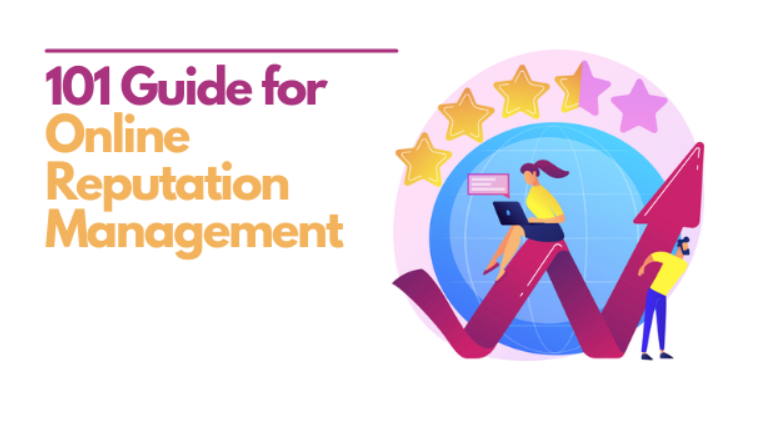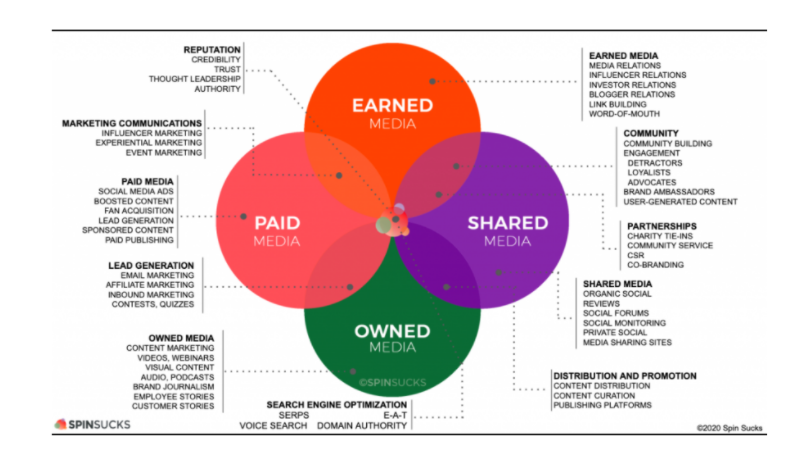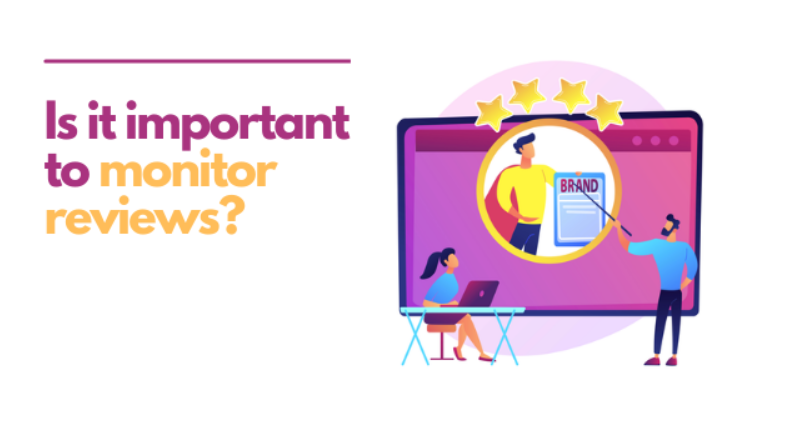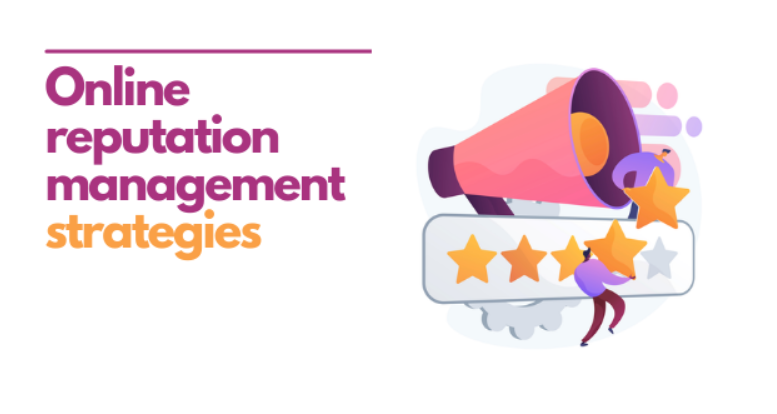Interested in knowing what is online reputation management? It might sound like some fancy concept, but it’s something well-known to every business.

Everyone knows what brand reputation is and how important it is for companies. But, gone are the days when companies were the main builder of their reputation. In todays’ online world, customers have taken the upper hand.
Reviews, both positive and negative, and your response to them are all part of your online reputation management.
Since it’s a pretty important concept, let’s explain it in more depth.
What is online reputation management?
First things first.
Online reputation management, or ORM, has the end goal of creating a positive reputation for a brand, company, or person. To be more specific, ORM also includes monitoring online reputation, promptly answering both positive and negative feedback, and defining strategies that can prevent or solve potential problems.
One might ask wouldn’t this be the same as PR?
Good question, but no, it’s not the same.
While PR activities usually have promotional nature, online reputation management is more focused on creating a long-term reputation. In other words, PR works in the spotlight, while the ORM is more of a behind-the-scenes player.
Although they’re not the same, together they can achieve optimal results.
But, since we’re focusing on online reputation management, let’s explain how it works.
How does it work?
Since online reputation management is all about monitoring your brands’ online presence and ensuring that the customers are left with a positive impression, all activities should also be pointed in that direction.
That being said, multiple channels are a part of online reputation management. Those channels are more known as a PESO model - Paid, Earned, Shared, and Owned media.

There are also some very important sub-categories to this model (which you can see on the diagram) but for the sake of clarity, we’ll be focusing on the 4 core ones.
-
Paid media
The name says it all. Paid media includes all activities that require payment (GoogleAds, sponsored posts, social media ads, etc.) What’s very good about this is that the company has full control over all activities.
-
Earned media
On the other hand, we have earned media as a part of online reputation management. Contrary to paid media earned media includes all the coverage that your brand receives for free. These might be:
- Blog posts
- External articles
- Industry-related listings (some of the listings do not come as free of charge, but there are lots of them that do)
- Forums
Even though you can affect these actions to some extent (for example, exchanging guest posts) usually these activities happen without the company’s intervention. Hence, customers tend to take them as trustworthy sources.
-
Shared media
As you can probably guess, shared media refers to managing your business's social media channels. Sometimes, brands tend to overlook this, but each day it’s becoming clearer why these channels can’t be neglected.
Todays’ customers find it easiest to get in touch with a brand over their social media channels. Therefore, having many unaddressed complaints or questions in general, low ratings on Facebook or unresponded mentions on Instagram and Linkedin can seriously harm your reputation.
-
Owned media
Again, the name is very much self-explanatory. Owned media in online reputation management stands for all the channels where you have full control over.
A good example of owned media is your website and blog. Besides taking care of the content part, it’s also important to pay attention to other SEO aspects. You should also work on improving your page and website ranking, and to do so, you need to optimize your website in the best possible way.
Taking care of everything that’s fully under your control is an easier part. But, monitoring customer reviews can be tricky.
But, is review monitoring so essential in the online reputation management process?
Is it so important for a business to monitor reviews?
A short answer would be - YES. But you’re here for more explanation, right?
Companies that are neglecting this aspect are usually arguing that there always will be negative comments, and you can’t address them all, so why even try?
But, as we already explained, online reputation management is so much more than dealing with negative comments. Comments, both positive and negative, are just the tip of the iceberg. The most important thing is happening under the surface. In other words, your job is to understand what those reviews mean and what the customers are trying to tell you.

-
Reviews - a modern version of Word-of-mouth
It’s super difficult to even remember the time without the Internet, but if we do, we’ll remember that people made purchasing decisions based on their family and friends' recommendations. Hence, the power of word-of-mouth was enormous, and brands couldn’t even affect it because there was no way of finding out what all those people think about them.
But, we can say that reviews are a modern version of the word-of-mouth concept. A good thing is that brands can be aware of the customers’ opinions since it’s publicly available.
For those who believe more in numbers than in words, many studies support this claim. Did you know that almost 86% of customers trust online reviews as much as a friend recommendation?
When someone is saying great things about your brand, you don’t have to worry. But, negative comments can be extremely harmful.
Most of you will probably remember the scandal that happened around Nestle a couple of years ago. Greenpeace accused them of doing some practices harmful to the environment. Not only has Nestle missed the opportunity to address the social media crisis, but it also worsened it by asking YouTube to remove the Greenpeace video. That created a complete media backlash resulting in Nestle temporarily shutting down its public page.
So, if such a huge company as Nestle couldn’t afford to neglect negative reviews, it’s clear that smaller companies can’t afford it too.
-
Appreciate the feedback
Many companies are spending so much money and resources on doing different surveys when they can get valuable insights just from the regular customer feedback. We’re not referring to bots, people who intentionally leave negative reviews all over the place, but genuine complaints coming from your everyday customers.
This can be a real treasure when it comes to improving customer satisfaction and your business as well. Therefore, make sure to dedicate some time to considering customer feedback. Responding to online reviews can seem as a time consuming task, but it's crucial for your business.
-
Impacting buying decisions
Expectedly, all this leads to the fact that online reputation management has an impact on buying decisions.
Maybe you don’t believe it, but 88% of customers are relying on customer reviews before making a purchase. Hence, your brand reputation is a real deal-breaker when it comes to making a final decision.
Okay, so it’s clear that it’s extremely important to monitor reviews. But is there a way to somehow influence your online reputation?
Yes, some strategies can come in very handy.
Let's check them out.
Beneficial strategies
Many strategies can influence your online reputation management, but we decided to show you the 3 most important ones. Also, please note that strategies can differ depending on your business needs, but these 3 are universal ones.

-
Address negativity
Deleting negative reviews is not recommended, but if they are responded to correctly, the whole situation can be turned to your advantage. For instance, Harvard Business Review did research showing that around 70% of customers who got a response to their complaints, remained faithful to the brand.
We understand that it might look easier to just ignore negative feedback, but that’s not a good approach. Addressing negativity is important because it shows customers that you’re willing to consider their issues.
-
Answer promptly
Whether the customer has left a positive or a negative review or maybe had some question, make sure to address it as soon as possible. If a customer decided to approach you by chat or by leaving a comment, it’s clear that they’re looking for an instant reply.
Besides answering promptly, you should make sure to answer with empathy.
Customer needs to feel understood, and for that to happen, you need to be (or at least seem) invested in their problem. Treating people with respect and kindness can open many doors.
-
Accept your mistakes
Sometimes, the easiest solutions are the best ones.
If your company made some slippery comment or did something that provoked public scrutiny, it would be best to just apologize. The worst, and we mean the ABSOLUTE WORST thing to do in this situation is to deny or to get extra defensive. Nothing can make an angry customer angrier than trying to deny your fault and making him look dumb.
Own up your mistake and craft your apology with the idea of showing remorse but resolving the issue at the same time. If for example, you saw a huge number of negative reviews on your social channels, then your apology should be published there.
Stay on top of the results
Now you know what online reputation management is, why is it beneficial, and how you can improve it. But, one question remains. Is there a way to monitor these reviews?
Keeping track of reviews on your platforms can be daunting, but it’s still manageable. But there are almost countless other platforms where customers can leave different reviews, and there’s no way to keep track of all of them.
However, there are different online tools, better known as online review aggregators, that are meant to help you. These tools are based on advanced data crawling/scraping API services. That’s very important because some websites have a complex structure, so not every online review aggregator can scrape them. One of the tools that can monitor even the worlds’ most complex websites is justLikeAPI.
JustLikeAPi was created in 2017, and today is working with more than 45 platforms (websites and social media channels) and the number keeps growing day by day.
Companies who want to monitor the market sentiment, are looking for a tool that can enable them to:
- perform login on a specific platform (on behalf of a particular user)
- fetch all comments from specified user's profile
- post a reply on a specific comment
As you can see, companies all over the world have recognized the importance of online reputation management, so make sure not to fall behind.
Wrapping it up
Online reputation management is a crucial part of your business strategy. The end goal is not to prevent negative feedback, because there will always be some, but the whole point is to define the right response strategy. People will always have an opinion about your business, and it’s on you to use it to your advantage.
The main purpose of online reputation management is to help you navigate through your online communications to establish a solid online reputation.
In case you're willing to share your opinion on this topic or your experiences down the road, please feel free to do so in the comments section.
This can be a bumpy road, so we hope that you’ll find this guide helpful. Therefore, we wanted to start our journey by explaining the very basics of online reputation management. But, in the following weeks, you will learn in more depth about this topic.
Stay tuned!
